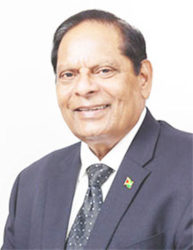Prime Minister Moses Nagamootoo yesterday said that while he is willing to engage with social partners such as the Private Sector Commission (PSC) and the trade unions he does not find their request to have an engagement on the budget while it is being debated in the legislature appropriate.
“It is not an unwillingness to engage. Basically the timing is wrong. I don’t find it appropriate to have a parallel engagement on the budget,” Nagamootoo told Stabroek News at parliament.
In a statement yesterday the PSC, TUC and FITUG said it appears that deliberate efforts are being made to avoid having an engagement with them. On December 9 the group had written to Nagamootoo (Leader of the House for Government Business), Dr Barton Scotland (Speaker) and Bharrat Jagdeo (Leader of the Opposition) seeking to have a meeting with the three to directly share opinions and highlight concerns about the budget.
“This request was made specifically to have our opinions considered in the deliberation of the Supply Committee,” the group said. However while, Jagdeo has agreed to meet with the three groups Scotland and Nagamootoo have not provided a similar response.

Asked by Stabroek News to address the issue, Nagamootoo said “I saw a letter. I consider them social partners and I received a letter Friday night from these partners. I indicated to my office that they should respond acknowledging the letter however I am not sure when or how exactly they are expecting us to facilitate this engagement.”
The Prime Minister explained that Guyana’s system of government relies heavily on the doctrine of separation of powers and that since the executive has already laid the budget in the legislature the legislative process must be completed.
“I don’t know if they were expecting that we can truncate the process. There was a period before the budget was laid when consultation was encouraged however once it reaches the legislature only one of two things can happen that is, the budget is either approved or not approved.
There is no unwillingness to meet but we are involved in a grueling, unending process as we consider the estimates. Basically the timing is wrong,” he explained.
In their letter, which was released to the media, the groups cited a range of provisions in the proposed budget that they have concerns over, including the new Value-Added Tax (VAT) and Pay As You Earn (PAYE) regimes, taxation on key services and the proposed garnishing of accounts of delinquent taxpayers by the Guyana Revenue Authority (GRA).
In addition to announcing the planned reduction of VAT from a rate of 16% to 14%, Finance Minister Winston Jordan also unveiled plans for the tax to be made applicable to monthly electricity and water consumption bills exceeding $10,000 and $1,500, respectively. The move to tax electricity and water has attracted widespread criticism.
Although they acknowledged that the APNU+AFC in its 2015 elections manifesto had committed to lowering the VAT, which they applauded, the three groups said they are concerned over the potential negative impact, both direct and indirect, on consumers, workers and citizens.
They also pointed to proposed new taxes on the utilities, including internet, as well as healthcare and education and noted that these are areas vital to the development and wellbeing of the country. “Though it is not being disputed the need to source funding for these, the concern is that the methodology being applied in achieving same may have adverse effects,” they added.
They also voiced concern over the removal of subsidies from the pension population, which was initiated in the administration’s inaugural budget last year.
“It is positively recognised that government has within its 18-month stewardship increased pension by 45%. With the removal of subsidised water and electricity from this vulnerable group, it is of concern their quality of life will face more challenges with new taxes added to other essential items and services,” they pointed out.
The letter urged a “stay” on the planned amendment of the Income Tax Act to facilitate garnishment by the GRA, saying there should be further consultation and deliberation. The strong view held is this is unnecessary based on existing powers and rights of collection, they said, while adding that it is important to have the contention resolved.
Lastly, in light of environmental compliance required by local manufacturers, the groups said tax measures, such as the environmental tax, should be “carefully considered” before implementation.
They further argued that the tax measures on the mining industry would reverse benefits from several concessions and should be removed since additional taxes ”would be a burden and disincentive” to participating in and upholding the standards of the sector.
“It is our collective view that should we objectively engage on the aforementioned issues, such would bode well for making the Budget an inclusionary document that the society can work with in achieving the objective of “Building a Diversified, Green Economy: Delivering the Good Life for All Guyanese,” they added.





